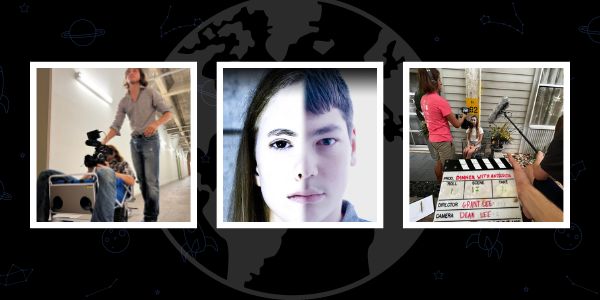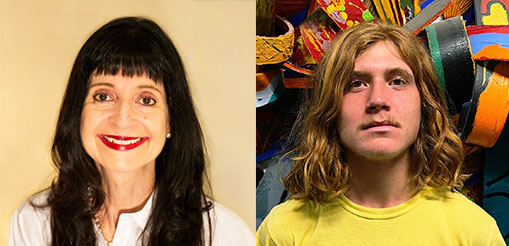This month, audiences can screen My Dinner With An Android on the Planet Classroom Network. This film is curated for the Planet Classroom Network by KIDS FIRST! Film Festival.
Explore the enigmatic world of My Dinner With An Android, a 30-minute cinematic masterpiece directed, written, and produced by Grant Lee Bomar.
In this investigative tale, filmmaker Milton Muybridge delves into the mysterious disappearance of AI scientist Talos Rosen. Through an interview with Brigitte Helm, the lone survivor of a peculiar dinner party where all guests vanish, the story explores the enigma: Did they truly disappear, or did something else transpire?
The Global Search for Education is pleased to welcome Grant Lee Bomar.
Grant, what inspired the unique blend of meta-mystery and artificial intelligence in your film, My Dinner With An Android?
It evolved throughout production as the core philosophical question the film poses. The meta-elements of the film serve as a parallel to the artificial intelligence to make a broader point. The artificial intelligence in the film is a malevolent force because it consumes the identities of those around it and recycles them as its own. On a societal level, cinema has the same impact and effect of capturing and influencing one’s identity. So the question at the end, is humanity ready for another reflection of itself, is open-ended with the implication being that the true power and inherent danger of all human creation, be it artificial intelligence or film, is the ability to influence and control the self and others. The meta-elements of the film present this as a dual narrative unfolds with the ambiguity of either the camera or the android consuming the identities of the characters in the film.
How did you balance the use of surreal imagery to enhance the narrative without overwhelming it?
All credit for the pacing and blending of the surreal within the film should go to Dean Lee Bomar, the cinematographer and editor. He spent many sleepless nights tooling and retooling each sequence of the film meticulously and has always had a keen sense of rhythm and timing. As with many creative processes, the end balance was a convergence of unforeseen accidents, carefully thought out and structured sequences, observation, and imitation of films we idolize, and lots of deleting and revisions. I can say that one of my favorite surreal scenes in the film, with Talos Rosen and Abel Bob Jones in the courtyard, was added almost two months after production had finished almost on a whim and was inspired by Lost Highway. How the end balance was achieved exactly is a bit of a mystery, but such is the creative process.
Can you share any challenges faced during the production, particularly in portraying the AI scientist character?
The production process was very interesting, as the film initially was meant to be a 2-3 minute short shot to test equipment and screen test some actors for a larger project. We liked what we had so much that it just kept evolving and expanding, and we’d have daily meetings to discuss what could happen next and added many pieces of the film on the go. This also meant we shot many sequences that never made it to the film or were greatly pared down. A challenge that arose from this was that the film began to lack a consistent structure. We experimented with having the narrative told from different characters’ perspectives, with the possibility of a witty narrator. Late into production, the opportunity arose to work with veteran actor Wilbur Fitzgerald, and we decided to add the documentarian character as a lynchpin for the film. Ultimately the freeform, improvisational structure that led to this point helped the film by allowing us to explore many ideas we otherwise wouldn’t have considered. The AI scientist character of Talos Rosen was an interesting character to create. The name is a mixture of Talos, a robot from Greek myth who protects Europa, and Rosen, the manufacturer of replicants in Do Androids Dream of Electric Sheep (changed to Tyrell corporation in the film Blade Runner). We’d worked with the actor who portrayed him, Ethan Gomez-Palayam, several times in the past but this was his most ambitious role to date. The restaurant used in shooting, The Third Space, is a business he and his family run, so he was instrumental in the production of the film on and off camera. One challenge in creating his character was to make him an antagonist but also a character one can sympathize with who had altruistic goals but couldn’t contain and was eventually consumed by his own greed – metaphorically and literally. As an archetype he is much like Victor Frankenstein, especially the version from the original novel.
In the ever-expanding AI genre, what do you hope viewers take away from your film’s perspective on the subject?
Ultimately, the film examines humanity more than the fear of artificial intelligence. Its advent is inevitable, and the question of the film is what can we learn about ourselves from artificial intelligence. While it operates in the mediums of meta-film and AI, the film explores an abstraction of how we form our identities from those around us, and the many pitfalls of the human condition. The key takeaway at the end is a sense of introspection about what identity and how we form it makes us human, and that AI cannot truly replicate that as all it knows is images taken of us. By extension, the source of the AI, the image of others, is most truly molded and captured by film, so the true revelation is that the most accurate reflection of the identities of others is not AI but the camera.
Thank you Grant!
C.M. Rubin with Grant Lee Bomar
Don’t miss My Dinner With An Android, now streaming on the Planet Classroom Network. This film is curated by KIDS FIRST! Film Festival for the Planet Classroom Network.







Recent Comments